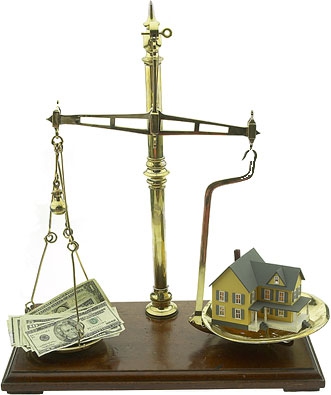As a result of the recent financial turmoil, many people who bought their homes expecting the value to go up have seen exactly the opposite. What are your options for getting out of a home that’s worth less than what you owe on it?
When you owe more on your home than it’s worth, trying to get your financial life back on track can be a tough to do. Holding onto a home on which you’re significantly underwater is not only a bad investment, but it can also compromise your ability to fulfill your other responsibilities. Fortunately, with the help of an experienced professional you can take advantage of one of several options which will allow you to put the consequences of the recent recession in your past. While each of these options will likely have a negative impact on your credit, in many circumstances this will be a reversible and worthwhile price to pay to get out of a bad loan.
1. Just Walk Away
A limited number of states have laws, called anti-deficiency statutes, which provide that if your home is surrendered, the lender can't sue you to recover the difference between what you owe and what the home eventually sells for. These are states that have decided that lenders, and not consumers, should bear the greater risk of a market downturn. There are a few downsides to walking away, however. The laws do not protect you from the negative impact that a surrender will have on your credit. Additionally, mortgage lenders in anti-deficiency states can very slow to take legal title to abandoned properties, leaving you responsible for HOA fees, property taxes, and premises liability. Additionally, the lender’s delay in retaking the property may lengthen the amount of time before you can qualify for financing to buy another home.
2. Loan Modification
If you expect your home to recover its value in a reasonable amount of time but are having a hard time making payments, it’s probably worth attempting to modify the loan. Every loan modification is done on a case-by-case basis so the results vary dramatically, but possible outcomes include forgiveness of missed payments or moving them to the end of the term, reduced interest rates, reduced payments, and very rarely a reduction of principal. Start by calling your local HUD office for free or low cost assistance, as they may already have agreements worked out with lenders and are familiar with the process. If you decide to attempt a loan modification, you’ll need to be patient and persistent. A common complaint is that the lenders frequently lose paperwork or requests the same information multiple times, so be sure to keep detailed records and copies and keep at it..
3. Short Sale
In a true short sale, you sell your home for less than what you owe on it and the lender agrees to forgive the difference. This is different than what many realtors and lenders have been calling a short sale – a transaction in which the sale of your home for less than what’s owed is approved, but the lender retains the right to sue you to collect the unpaid balance on your loan. This major distinction makes it very important that you find a realtor who has a strong background in short sales, rather than someone who is just marketing themselves that way. Getting the wrong type of short sale can be worse for you than doing nothing at all, and an experienced realtor will know what sorts of offers are most likely to get accepted by the bank.
4. Deed in Lieu of Foreclosure
A deed in lieu involves the voluntary surrender of property to lender, thus avoiding the expensive foreclosure process and a time consuming and effort intensive short sale. Most lenders won’t even entertain this option unless you’ve had the home on the market for some time and you can show that you can’t afford to keep paying. Because a deed in lieu results in the lender avoiding the legal costs of foreclosure, they may be willing to offer you a small amount of money to vacate quickly and keep the property in good condition, sometimes know as a “cash for keys” program. As with all of the options listed here, you’ll want to have this process overseen by an experienced real estate professional or attorney to make sure that you don’t remain liable for the deficiency.
5. Chapter 13 Bankruptcy
Chapter 13 bankruptcy is a powerful tool which, in some instances, can allow you to both keep you home and dramatically reduce the amount you owe on it. The first benefit to Chapter 13 is that it will stop a foreclosure, even if you’re very close to the sale date. Second, Chapter 13 provides you with an opportunity to get caught up on missed payments over a period of three to five years. Finally, you may qualify for what’s known as a Lien Strip. In a nutshell, if your home is worth less than the first mortgage, certain additional encumbrances like a second mortgage or line of equity secured by the property can be “stripped off” – that is, you're no longer responsible for them. While bankruptcy is a time consuming endeavor, the protections provided by the court often make it a smoother process that those listed above.
6. Chapter 7 Bankruptcy
Chapter 7 is designed to give you a “fresh start,” in that it provides a discharge of your debt in as little as a few months without the repayment required in a Chapter 13. This means that you can walk away from your home and most of your debt without worrying about being sued months later. That said, a Chapter 7 may also help you to keep your home by improving your ability to pay your mortgage (as you won’t be paying those huge credit card bills anymore), or by giving you some leverage with the bank in your negotiations over a loan modification. Chapter 7 is most appropriate when you have a significant amount of debt in addition to your mortgage. While Chapter 7 bankruptcy likely has the greatest negative effect on your credit score, it does give you the most comprehensive benefit, and provides the quickest path back to home ownership under many forms of financing.
Important Considerations
Lenders are not in the business of letting you off the hook easily, so you’ll want to make sure you have an experienced advocate on your side. This will help you avoid the unpleasant surprise of a debt collection lawsuit months after you thought you were done and ready to get on with your life.
Also keep in mind that each of these tools may have some form of tax repercussion. Forgiven debt (but not debt discharged in bankruptcy) is treated as income for tax purposes and may result in a liability at the end of the year. While Congress has passed legislation under which, for a limited time, the debt forgiven on a primary residence is not treated as taxable income, the rules surrounding the application of this legislation are very specific rules, so be sure to consult your CPA or attorney.
Related Articles:
- How to Choose a Bankruptcy Attorney
- How To Save On Closing Costs
- How To Buy A Short Sale Property
- Debt Relief: How to guide to get help
- HAFA Provides Short Sale and Deed-In-Lieu Options Instead of Foreclosure
- Loan Modification: Is it Right for You?
- What Is Foreclosure?
- Avoiding Foreclosure Rescue Scams
- What Is A Deed-In-Lieu?
- How To Avoid Foreclosure
- Do You Qualify for an FHA Loan?
- Mortgage Fraud: How to Protect Yourself!
- For Sale By Owner: How to Sell Your Own Home
- Selling Your Home? Try These Creative Strategies
 Print
Print Email
Email










